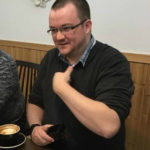 Two Conversations About Teaching
Two Conversations About Teaching
by Bryan Hale.
Mina
Mina (not her real name) and I are both sitting on a brightly colored and comically large chair in the reception area of the hagwon we work in. A “hagwon” is a private language academy in Korea. Actually, our work day should be over already, but we’re waiting for the hagwon owner to arrive with guests for some kind of promotional event. The hagwon is sinking and neither of us has been paid for some time.
We’re not quite sitting next to each other, but at a kind of perpendicular angle, almost back to back. Despite the awkward position, we’re suddenly having a vivid conversation about one of our kindergarten classes, sharing a rush of details and observations over our shoulders. The students’ English levels have been getting more and more divergent. Are we doing enough for all of them?
Mina says something. “You never check if they’ve really learned.”
Wow. I’m stung. I’ve been babbling but suddenly don’t know what to say.
I also kind of want to cling to Mina and beg her to tell me everything behind that comment: all the little details she took in that led to it, all the little changes she would prefer to see.
It’s been a steep learning curve, this job. Learning how to make sure the parents are kept happy. Learning how to make sure the owner has the impression the parents are being kept happy. Learning how to do two pages of the textbook each lesson, no matter what, and learning how to make sure it’s visible we did the two pages. But here, where we’ve collapsed into this whirlpool of an honest talk, what Mina wants to let me know is that among all that, real learning also matters. And she can see that I’m not getting real learning to happen as much as I could.
Mina was my head teacher in this, my first teaching position. The conversation this day wasn’t the only one like it. The hagwon’s troubles accelerated things, washing away assumptions that had kept us from talking more honestly, and helping me to realize the value in really learning from Mina, beyond the prescriptions and roles of our official relationship. There was a lot to learn. She knew her students so well. She knew what they had learned and how they had learned it. And she knew how that connected to their emotional experiences. She knew her students as a whole, like a detailed landscape, full of continuities and breaks. In the middle of chaotic afternoon comings-and-goings here in the reception area, she could stand in the middle of it all and help three very different students have three different learning experiences, in a single breath. Perhaps I learned more from Mina than any other single colleague, and a part of me still wants to cling to her and ask a million questions.
Reflective Practice
Somewhere outside it’s a rainy day in Seoul. I’m stumbling into a narrow, windowless room at the back of a cafe, guided by an invite over social media and my phone GPS. It’s my first ever Reflective Practice meeting.
I don’t think I need to keep names secret here: this meeting is facilitated by Mike Griffin and Alex Walsh. And Anne Hendler is here too! I don’t actually remember the topic of the meeting and I definitely don’t remember the words verbatim like I do with Mina. I do remember Mike setting up a discussion with a friendly suggestion that we not try to solve each other’s problems and instead help each other along with follow-up questions. Suddenly I’m talking to someone I’ve never met before, a rich and rewarding exchange about our teaching experiences flowing easily. Mike appears behind her, listening in for a moment, gently cutting in with a question that helps open up a story I’m sharing. Then he disappears again. The room stops feeling small.
While the details aren’t burned into my memory as clearly as with Mina, this feels like a part of a bigger and ultimately much more important conversation that I’m still taking part in. It connects to my present partly because I remain involved with the same Reflective Practice group, but it also extends across various professional development contexts, including KOTESOL, iTDi, excitELT, the temporary physical spaces around the edges of conferences, other online spaces. Although serendipity plays a role, and although there have been many opportunities for me to receive advice and to learn from teachers such as Mike and Alex and Anne, this is a conversation where I’m in charge of my participation. In this conversation I’m not adrift, and the need to plead or cling falls away. This conversation is collegial and collaborative and open-ended.
I’m grateful for both conversations.
